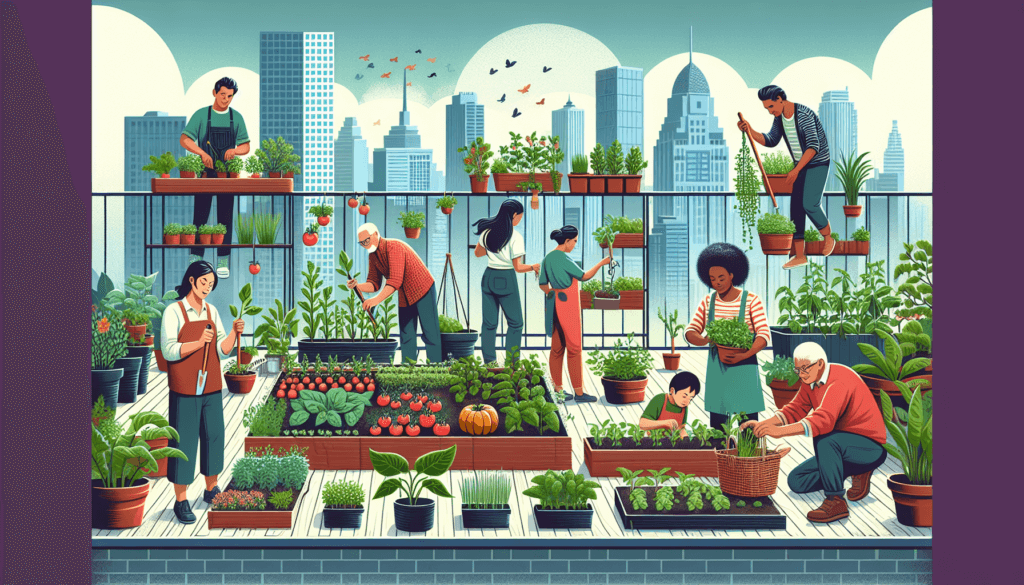Urban gardening has become increasingly popular in recent years, and for good reason. Not only does it allow you to enjoy the beauty of nature in the heart of the concrete jungle, but it also offers a plethora of benefits that positively impact your physical, mental, and emotional well-being. From improving air quality to reducing stress levels, urban gardening has the power to transform not only your environment, but also your quality of life. In this article, we will explore ten remarkable benefits of urban gardening that will surely inspire you to grab a shovel and start planting.

Improved air quality
Urban gardening offers numerous benefits, starting with an improvement in air quality. With the rise of urbanization and industrialization, air pollution has become a significant concern for many cities. However, urban gardening can play a vital role in reducing air pollution. Plants are natural air purifiers, capable of absorbing harmful pollutants such as carbon dioxide and releasing oxygen. By incorporating green spaces into urban areas, you can contribute to cleaner and fresher air for all.
Reduction in air pollution
Not only does urban gardening improve air quality, but it also helps reduce air pollution. By planting trees, shrubs, and other greenery, you can create a natural barrier that filters out pollutants from the surrounding environment. These plants act as a buffer, absorbing pollutants like particulate matter and volatile organic compounds (VOCs), thereby minimizing their entry into the atmosphere. Through the collective efforts of urban gardeners, we can decrease the harmful impact of pollutants and create a healthier living environment.
Increase in oxygen production
Another significant benefit of urban gardening is the increase in oxygen production. As plants undergo photosynthesis, they absorb carbon dioxide and release oxygen. By planting more greenery in cities, the oxygen levels can be boosted, providing a fresh and breathable atmosphere. This surge in oxygen production not only enhances the well-being of individuals but also benefits the overall ecosystem. Imagine strolling down the street surrounded by lush greenery and breathing in the invigorating air – urban gardening can make this a reality.
Enhanced mental well-being
In addition to the physical benefits, urban gardening can also positively impact mental well-being. Stress has become a prevalent issue in today’s fast-paced urban lifestyle, but gardening offers an effective way to unwind and relax. Engaging in gardening activities allows you to connect with nature, which has been proven to reduce stress levels and improve overall mood. The act of caring for plants and witnessing their growth can be incredibly rewarding and serve as a therapeutic outlet for stress relief.
Stress reduction
Urban gardening provides an oasis amid the hustle and bustle of city life. The process of nurturing plants and experiencing the natural world can help alleviate stress. Whether you have a small balcony garden or a community plot, spending time in these green spaces allows you to escape the pressures of everyday life. Engaging in gardening activities, such as planting, watering, and tending to plants, offers a sense of calm and tranquility, helping you unwind and recharge.
Improved mood and mental health
Studies have shown that spending time in green spaces can lead to an improvement in mood and mental health. Urban gardening provides an opportunity to connect with nature and experience its positive effects firsthand. Whether you are growing flowers, herbs, or vegetables, the joy of seeing your plants thrive can bring a sense of accomplishment and happiness. Additionally, the exposure to sunlight while gardening can boost vitamin D levels, enhancing overall well-being and reducing the risk of mood disorders.

Increased access to fresh produce
Urban gardening offers a solution to the limited accessibility of fresh produce in densely populated areas. By cultivating your own fruits, vegetables, and herbs, you can ensure a continuous supply of nutritious food right at your doorstep. This accessibility eliminates the need for long-distance transport and reduces the reliance on grocery stores, which often import produce from faraway locations. Instead, you can enjoy the benefits of fresh, homegrown produce that is not only delicious but also packed with essential vitamins and minerals.
Economical option
Growing your own food through urban gardening can also be an economical option. The cost of purchasing fresh produce from supermarkets can add up over time, especially for families. By cultivating your own fruits and vegetables, you can significantly reduce your grocery expenses and save money. Furthermore, the investment in gardening supplies, such as seeds and soil, can often be recouped multiple times over through the produce you harvest. Urban gardening provides an opportunity to eat healthy while saving money.
Varied and nutritious food choices
One of the advantages of urban gardening is the ability to choose from a wide variety of fresh and nutritious food options. While supermarkets may offer a limited selection, gardening allows you to grow an array of different fruits, vegetables, and herbs. You can experiment with unique and heirloom varieties that are not commonly available in stores, adding excitement and diversity to your meals. Moreover, growing your own produce ensures that you have control over the use of pesticides and can prioritize organic and sustainable farming practices.
Promotes community and social interaction
Urban gardening has the power to bring communities together and promote social interaction. By creating shared green spaces, neighbors can bond over their common interests in gardening and plant care. Community gardens can serve as meeting points where individuals of all ages and backgrounds come together to cultivate and nurture plants. This shared experience fosters a sense of connection, increases social cohesion, and strengthens neighborhood ties. Through collaborative efforts, urban gardens create a supportive and inclusive atmosphere for all.
Strengthening neighborhood ties
Urban gardening can strengthen neighborhood ties by providing a platform for communication and cooperation among residents. Whether it’s through organizing gardening workshops, exchanging gardening tips, or sharing surplus produce, individuals can engage in meaningful interactions with their neighbors. These shared experiences can lead to lasting friendships and a greater sense of belonging within the community. Urban gardening serves as a catalyst for building strong, interconnected neighborhoods, where people come together to create and nurture vibrant green spaces.
Shared knowledge and resources
In urban gardening communities, individuals can share their knowledge and resources, fostering a culture of learning and collaboration. Gardeners with more experience can mentor beginners, providing guidance and valuable insights into plant care. In turn, novices can offer fresh perspectives and innovative ideas, contributing to the collective knowledge base. Sharing tools, seeds, and other gardening resources ensures that everyone has access to the necessary materials, making urban gardening a collaborative and inclusive endeavor.

Creates green spaces
One of the most visible benefits of urban gardening is the creation of green spaces throughout the city. Incorporating gardens into urban areas not only enhances the aesthetics but also contributes to the overall well-being of residents. These green spaces serve as havens that provide respite from the concrete jungle, offering a peaceful retreat amid the urban hustle. Whether they are public parks or private rooftop gardens, these green spaces bring nature closer to urban dwellers and contribute to a healthier and more sustainable environment.
Improves aesthetics
Urban gardening plays a crucial role in improving the aesthetics of urban areas. The introduction of greenery adds vibrancy and beauty to otherwise concrete-dominated landscapes. From rooftop gardens to vertical plantings on building facades, the sight of plants thriving amidst the urban jungle is visually appealing. Beyond their aesthetic value, green spaces also soften the harshness of cityscapes and create a more inviting and pleasant atmosphere for residents and visitors alike.
Mitigates urban heat island effect
The presence of green spaces in urban areas can help mitigate the urban heat island effect. Urban heat islands occur when the built environment absorbs and retains heat, leading to higher temperatures in cities compared to surrounding rural areas. By incorporating greenery, such as trees and vegetation, the heat absorbed by buildings can be reduced through shading and evapotranspiration. This natural cooling effect helps alleviate the intensity of urban heat islands, making cities more comfortable and livable, particularly during hot summer months.
Reduces food miles and carbon footprint
Urban gardening contributes to a significant reduction in food miles and carbon footprint. Food miles refer to the distance that food travels from the farm to the consumer, which often involves long-distance transport and refrigeration. By growing your own produce or supporting local urban farms, you eliminate the need for extensive transportation and reduce the associated greenhouse gas emissions. This shift towards locally sourced food decreases carbon emissions and promotes a more sustainable and environmentally friendly food system.
Less reliance on long-distance transport
Urban gardening reduces the reliance on long-distance transport for food supply. Instead of relying on produce that may have been shipped from across the country or even internationally, urban gardeners can enjoy the fruits of their labor without the need for extensive transportation networks. This decreased reliance on long-distance transport not only reduces the environmental impact but also ensures a more secure and resilient food supply. By fostering self-sufficiency within local communities, urban gardening contributes to a more sustainable and localized food system.
Lower greenhouse gas emissions
Urban gardening also leads to lower greenhouse gas emissions compared to conventional agricultural practices. Traditional agriculture methods often involve the use of heavy machinery, synthetic fertilizers, and pesticides, all of which contribute to the release of greenhouse gases into the atmosphere. In contrast, urban gardening emphasizes organic and sustainable practices, minimizing the use of chemical inputs and reducing overall emissions. The adoption of environmentally friendly gardening techniques helps combat climate change and create a greener and healthier planet for future generations.

Encourages physical activity
Engaging in urban gardening encourages individuals to be physically active and promotes a healthy lifestyle. Gardening activities, such as digging, planting, weeding, and harvesting, require moderate physical exertion, making it an excellent form of exercise. Spending time outdoors, getting your hands dirty, and tending to plants not only improves cardiovascular fitness but also strengthens muscles and increases flexibility. Whether you have a small balcony garden or access to a community plot, urban gardening provides an enjoyable and rewarding way to stay active.
Engages individuals in moderate exercise
Urban gardening provides an opportunity for individuals to engage in moderate exercise without the need for a gym membership or specialized equipment. The physical tasks involved in gardening, such as digging, raking, and lifting bags of soil, provide an effective workout for the body. These activities promote strength, endurance, and flexibility, contributing to overall fitness. Spending a few hours each week dedicated to urban gardening can help you stay active and improve your physical well-being.
Promotes a healthy lifestyle
Incorporating gardening into your daily routine promotes a healthy lifestyle. By tending to plants and engaging in outdoor physical activity, you increase your exposure to sunlight, which is a natural source of vitamin D. This vitamin is essential for bone health, immune function, and overall well-being. Additionally, the act of growing your own food encourages a more mindful approach to eating. It fosters an appreciation for fresh, whole foods and enables you to make healthier food choices. Urban gardening serves as a tool to integrate wellness into daily life, cultivating a holistic and balanced approach to health.
Supports biodiversity
Urban gardening plays a significant role in supporting biodiversity within cities. By creating green spaces, you provide habitats for beneficial insects and pollinators, such as bees and butterflies. These creatures play a vital role in the reproduction of plants and contribute to the overall health and diversity of ecosystems. Urban gardens can attract a variety of species, including birds and small mammals, further enriching biodiversity in urban areas. By nurturing local flora and fauna, urban gardening fosters a harmonious coexistence between humans and the natural world.
Provides habitats for beneficial insects
Urban gardens act as refuges for beneficial insects, often referred to as nature’s pest control. Planting a diverse range of flowering plants and herbs attracts bees, ladybugs, and other predatory insects that help control harmful pests naturally. By creating a welcoming environment for these beneficial insects, you can reduce the need for synthetic pesticides, minimizing the harmful impact on ecosystems. Urban gardening promotes the balance and resilience of ecosystems by supporting the essential role of beneficial insects in pest management.
Preserves native plant species
Urban gardening can also contribute to the preservation of native plant species, which are vital for ecological balance. By cultivating and propagating native plants, gardeners can help maintain the unique characteristics of local ecosystems. Native plants provide sustenance and habitat for native wildlife, supporting the intricate web of life in urban areas. By incorporating native species into urban gardens, individuals actively contribute to the protection and conservation of valuable plant diversity, ensuring its survival for future generations.
Educational opportunities
Urban gardening offers valuable educational opportunities, serving as a platform for learning about plant biology and ecosystems. Whether you are a student, a parent, or someone interested in expanding your knowledge, gardening can provide hands-on experience in understanding nature’s processes. Observing plant growth, studying soil composition, and learning about different plant species promote a deeper understanding of the natural world. Moreover, urban gardening can educate individuals on sustainable practices, such as composting, rainwater harvesting, and responsible water usage, fostering a culture of environmental stewardship.
Teaches about plant biology and ecosystems
Through urban gardening, individuals can gain practical knowledge about plant biology and ecosystems. By observing the life cycle of plants, from germination to flowering and fruiting, you can witness firsthand the intricate processes of nature. Experimenting with different growing techniques and understanding the needs of various plant species allows you to develop a deeper understanding of how plants function and interact with the environment. Urban gardening serves as an outdoor classroom that provides valuable lessons about the complexities of the natural world.
Promotes sustainable practices
Urban gardening promotes sustainable practices that contribute to a greener and more sustainable future. By embracing organic and natural gardening methods, such as composting, vermiculture, and using rainwater, you can minimize the use of artificial inputs and reduce waste. Composting kitchen scraps and plant waste enriches the soil naturally, reducing the need for synthetic fertilizers. Collecting rainwater for irrigation conserves water resources and reduces the strain on municipal water supplies. By adopting sustainable gardening practices, you can lead by example and inspire others to make environmentally conscious choices.
Lowers urban temperatures
Urban gardening plays a vital role in lowering urban temperatures, creating a more comfortable living environment. The presence of green spaces, including trees, lawns, and gardens, helps reduce the heat island effect in cities. Trees provide shade, thereby reducing the amount of sunlight absorbed by buildings and pavement surfaces. Through the process of evapotranspiration, plants release moisture into the air, creating a cooling effect. These combined efforts help alleviate the intensity of urban heat, making cities more bearable during hot summer days.
Provides shade and reduces heat
One of the immediate benefits of urban gardening is the provision of shade, which helps reduce temperatures and minimize heat-related issues in urban areas. Trees, in particular, offer a natural shade canopy, shielding buildings and outdoor spaces from direct sunlight. By strategically planting trees in cities, you can create shaded areas that offer respite from the heat, providing a more pleasant and comfortable environment for residents and visitors. Urban gardening enables individuals to contribute to the cooling efforts and make a significant impact on urban heat reduction.
Alleviates urban heat island effect
The urban heat island effect refers to the phenomenon in which urban areas experience higher temperatures compared to surrounding rural areas. This disparity is caused by factors such as the abundance of buildings and pavement, which absorb and retain heat. Urban gardening helps alleviate the urban heat island effect by introducing vegetation that mitigates the heat buildup. Through shading, evapotranspiration, and the cooling properties of plants, urban gardens provide a natural solution to reducing the temperature gap and creating a more livable cityscape.
In conclusion, urban gardening offers numerous benefits to individuals and communities alike. From improving air quality to enhancing mental well-being, urban gardening has the power to transform urban environments for the better. By creating green spaces, promoting sustainable practices, and fostering biodiversity, we can build healthier, more resilient cities that prioritize the well-being of both humans and the environment. So, why not grab a shovel, some seeds, and start your own urban garden today? You’ll not only reap the rewards of fresh produce and a greener urban landscape but also contribute to a brighter and more sustainable future.


